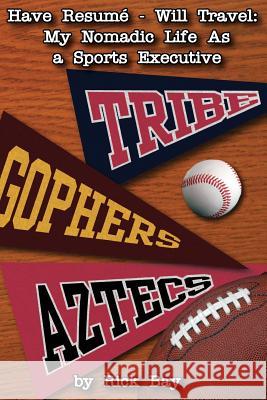Have Resumé - Will Travel: My Nomadic Life as a Sports Executive » książka
Have Resumé - Will Travel: My Nomadic Life as a Sports Executive
ISBN-13: 9781493619283 / Angielski / Miękka / 2014 / 278 str.
"Have Resume - Will Travel: My Nomadic Life as a Sports Executive" is a sequel to Rick Bay's first book, "From the Buckeyes to the Bronx," published in 2013, chronicling the author's time as athletics director at Oregon and Ohio State and his brief, but tumultuous, tenure as chief operating officer of the New York Yankees. The memoir picks up in 1988, shortly after Bay left the Yankees and had a cup of coffee as COO for a fledgling television production company. The story really begins, though, when he was named director of men's athletics at the University of Minnesota, not quite Ohio State, but a great Big Ten university, nonetheless. "Enter smiling" was not the stage direction for that job. He was inheriting the end of one NCAA investigation and the beginning of another. Then, less than a year after his arrival his president dropped this bombshell: the Big 10 presidents, without the consultation of any of the conference's ADs, had adopted Penn State as the 11th member of the Big Ten. This account, then, covers the challenges of working through two NCAA inquiries, as well as the behind-the-closed-doors intrigue of the first Big Ten expansion in 43 years. Near the end of his third year in the Twin Cities, the Cleveland Indians, the worst team in baseball, took an unexpected flier and hired Bay to become the club's new president. This time he could "enter smiling." The organization was building an exciting young team for its new downtown ballpark. Cleveland baseball was rejuvenating itself. It was alive and exciting for the first time, really, since 1954. The club's new team - it boasted future stars such as Carlos Baerga, Albert Belle, Kenny Lofton, Jim Thome, Sandy Alomar, Jr. - eventually would nearly win the world championship. As the young, maturing club met its challenges, Bay's, he quickly discovered, was trying to connect with Indians owner and his boss, Dick Jacobs. Ironically, the man who hired him now wanted his job. His final appointment desperately lacked the marquee value of most of the others. He became AD at San Diego State, a job no one else really wanted. For eight years he fought the underdog's fight. He indulged his president's unwise decision to attempt to change the school mascot; he hired the right coach for basketball, the wrong one for football, and fought a mostly silent battle of wills with an entrenched baseball coach. He was blackballed by his AD peers for being a "voice in the wilderness" against the bullying tactics of the Bowl Championship Series (BCS), and was criticized for daring to speak out against one portion of the sacrosanct Title IX legislation. Finally, he disputed the findings of a California State University equipment room audit, which cost him his job. When he left SDSU in 2003, Bay had held six sports executive jobs in 23 years at some of the most visible, if not prominent organizations in the industry. He attacked every opportunity with abandon, "willing to be fired" in an effort to do his job the right way. Clearly, Bay was better at getting jobs than he was at keeping them. He didn't plan it that way. But each experience was fascinating, creating a career rich with an index of stories and anecdotes thick enough to fill the pages of two books.
Zawartość książki może nie spełniać oczekiwań – reklamacje nie obejmują treści, która mogła nie być redakcyjnie ani merytorycznie opracowana.











